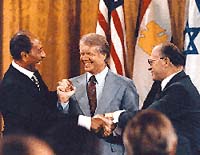Course home
page
Assignment
Why, after over thirty years of hostilities,
did Israel and Egypt finally begin to reach a peace agreement in 1978?
Background
On 17 September 1978, Israel and Egypt signed
two agreements, the first between Israel and any of its Arab neighbours.
The Camp David Accords were negotiated by the Israeli prime minister Menachem
Begin and the Egyptian president Anwar Sadat under the mediation of U.S.
President Jimmy Carter at the government retreat at Camp David,
Maryland.
Egypt and Israel had technically been at war
since Israel's founding in 1948, and the latter had occupied the Sinai Peninsula
(Egyptian territory) during the Six-Day War of 1967. War had again broken
out in 1973. The Accords had their origin in Sadat's unprecedented
visit to Jerusalem--the first visit ever by the chief of state of an Arab
nation to Israel--on 19-21 November 1977 to address the Israeli government
and Knesset (parliament) on the subject of
peace.
Sadat's visit initiated peace negotiations between
Israel and Egypt later that year. The discussion continued sporadically
into the following year, but when a deadlock ensued, Sadat and Begin accepted
President Carter's invitation to a meeting at Camp David on 5 September
1978. Carter's had work tirelessly since his inauguration to find a
way to bring about a permanent peace in the Middle East, and he now seized
the initiative.
After twelve days of negotiations mediated by
Carter, Sadat and Begin concluded two agreements: (1) a framework for the
conclusion of a peace treaty between Egypt and Israel and (2) a broader framework
for achieving peace in the Middle East. The first provided for a phased
withdrawal of Israeli forces from the Sinai Peninsula and that region's full
return to Egypt within three years of the signing of a formal peace treaty
between the two countries. It also guaranteed the right of passage for Israeli
ships through the Suez Canal. (2) The more general framework called
in vague terms for Israel to gradually grant self-government and/or autonomy
to the Palestinians in the Israeli-occupied West Bank and Gaza Strip and
to partially withdraw its forces from those areas in preparation for negotiations
on their final status of autonomy after a period of three years. Many
experts regarded the "spirit" in which the two agreements had been negotiated
as far more important than their
substance.
The peace treaty that Israel and Egypt eventually
signed on 26 March 1979 closely reflected the Camp David Accords. Again,
it was President Carter who had intervened to rescue the deteriorating peace
talks with personal visits to both countries. The treaty formally ended
the state of war that existed between the two countries, and Israel agreed
to withdraw from the Sinai Peninsula in stages. The treaty also provided
for the establishment of normal diplomatic relations between the two countries.
These provisions were duly carried out, but Israel failed to implement the
provisions calling for Palestinian self-rule in the West Bank and Gaza
areas.
The Camp David Accords and resulting peace treaty
were a true foreign policy success for all involved.
Timeline
| May 1948, Israel became independent.
October 1956, Suez Canal Crisis.
5-10 June 1967, Six Day War.
October 1973, Yom Kippur War.
|
|
 |
14 March 1976, Egypt terminated its treaty of
friendship with the Soviet
Union.
2 November 1976, James Earl Carter elected U.S.
President.
21 November 1977, Anwar Sadat addressed the
Knesset (Israeli parliament) and declared that it was time to reach a peace
agreement and to settle the Palestinian
question.
17 September 1978, Sadat and Israeli Premier
Menachem Begin signed the Camp David
Accords.
5 November 1978, Arab League denounced
Egypt.
1978, Menachem Begin and Anwar Sadat won the
Nobel Peace Prize.
26 March 1979, Israeli-Egyptian treaty completed
and signed.
25 May 1979, Israelis began to withdraw from
the Sinai Peninsula.
25 April 1982, last Israeli forces left the
Sinai Peninsula.
WWW sites
There is a substantial exhibit devoted to the Camp David negotiations online,
including President Carter's invitation letter to Prime Minister Begin,
the accords and a day-by-day calendar of events.
You can listen to Anwar
Sadat's Speech to the Israeli Parliament of 20 November 1977 that started the peace process.
The full text of the Camp
David Accords signed by Egyptian President Anwar Sadat and Israeli
Prime Minister Menachem Begin in Washington, DC on 17 September 1978 are on line. There
are alternative sites: gopher,
mirror, Avalon Project and similar.
The Peace
Treaty (or www.mideastweb.org/egyptisraeltreaty.htm) between Israel and Egypt from 26 March 1979 is online (duplicate site), as well
as the accompanying Exchange of Letters and the Memorandum
of Agreement between the US and Israel.
There are a series of chronological historical
documents relevant to the Egyptian-Israeli peace process available:
The Middle
East Peace Process, 1998 is a series of recent documents, briefing
transcripts, press statements, etc., about the ongoing peace process (with
some further links).
Other Sites:
Recommended Books
These three memoirs are "must" reading:
- Jimmy Carter, Keeping Faith: Memoirs of a President (New York, 1982).
- Anwar Sadat, Those I have Known, Foreword by Jimmy Carter (New York, 1984).
- Anwar Sadat, In Search of Identity: An Autobiography (New York, 1978).
Other books devoted to the Camp David Negotiations include:
- Jay Laub, The Development of the Israeli-Egyptian-American Relationship from the Death
of Egyptian President Gamal Abdel Nasser in September 1970 to the Camp David Agreements in
September 1978 (London, 1998).
- Linda Miller, Shadow and Substance: Jimmy Carter and the Camp David Accords (1992).
- William Quandt, ed., The Middle East: Ten Years after Camp David (Washington, DC, 1988).
- William Quandt, Camp David: Peacemaking and Politics (1986).
- Robert Freedman, ed., The Middle East since Camp David (Boulder, CO, 1984).
- Melvin Friedlander, Sadat and Begin: The Domestic Politics of Peacemaking (Boulder, CO, 1983).
Related Events
| Israel
|
| Suez Canal Crisis
|
| Six Day War
|
| Yom Kippur War
|
| Anwar Sadat
|
| Menachem Begin
|
| Jimmy Carter
|
|

